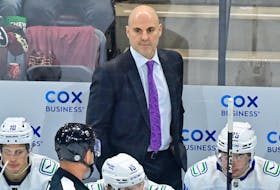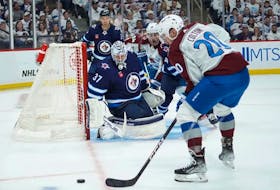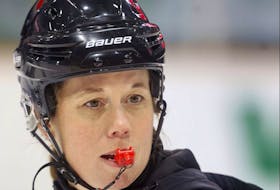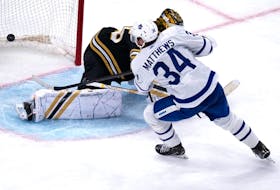Todd Stark has no problem supporting changes that provide minor hockey players with equal opportunity to embrace the game they love.
Stark, who coaches in the Deer Lake minor hockey system, shared his thoughts on changes to Hockey Newfoundland and Labrador’s ice time allocation policy for the 2014-2015 season Monday afternoon when contacted by The Western Star.
In Gander this past weekend, the minor council for Hockey Newfoundland and Labrador approved changes to the ice time allocation policy during the provincial hockey group’s semi-annual meeting.
Delegates approved a change to Discretion 1 of the policy, which is geared specifically to exhibition, invitational and provincial play for players from peewee to midget, both male and female. The new policy provides players with equal ice time in the first and second periods of a game. There is an option for a coach to use select players in the last three minutes of the third period (and overtime) and on all special team situations in the third period (and OT).
Last year, the policy allowed for coaches to use select players only in the final three minutes of every period and they had the ability to use whomever they wanted on special teams throughout the game.
“All the kids really deserve the same experience,” Stark said Monday.
Stark has two sons — first-year peewee Ethan and first-year midget Daniel — lacing up the skates in the Deer Lake minor hockey system.
He points out that every child pays the same registration fees and shares a common thread: they are looking to have fun and enjoy the same experience so it’s a boost to their self-esteem if they get an equal chance to play the game.
“They love their games and they want to get a chance to fully participate in them, so I think it’s a good thing,” he said, adding the goals is to provide a positive experience that helps maintain the players’ involvement in hockey.
Stark acknowledged that the focus on minor hockey these days is more about skill development and being competitive, so having fun sometimes seems to get lost.
While winning is certainly important to both players and coaches, he wants people to really look at the big picture when a player comes to the rink, since most players won’t go on to earn a scholarship or a pay cheque to play the game.
With this in mind, he said, the focus should be on making hockey a rewarding experience at the recreational level.
Previously, a coach who violated the ice time policy received a verbal warning for a first-time offence and a one-year suspension for the second time. The new policy isn’t so tough — a tiered-system goes from a written warning from the respective association for first-time violations. A second offence will lead to a suspension of one month, as long as the team has played a minimum of five games in that timeframe. A coach in violation for the third time will receive a one-year suspension from coaching circles and a fourth incident is an indefinite suspension subject to review by the branch mandatory.
Stark believes the message is clear that everybody wants coaches to be more accountable to ensure the players all enjoy themselves, and that’s fine with him.
His two sons love the game because they are having fun and getting a fair shake.
He hopes that is a constant for the rest of their minor hockey career.
“Coaches need to keep in mind the fact that all the kids are eager to develop and get their opportunity to enjoy the game.”








